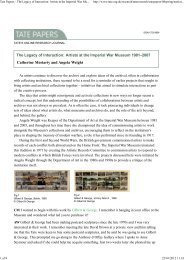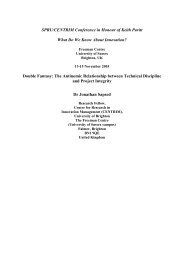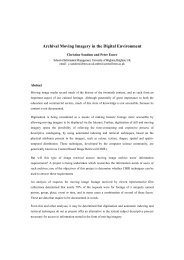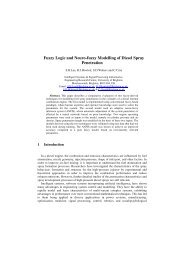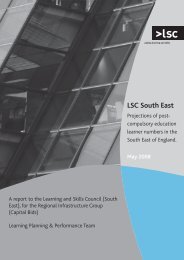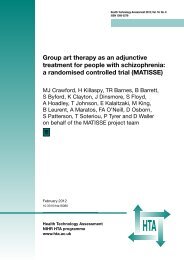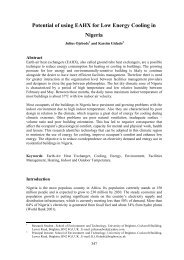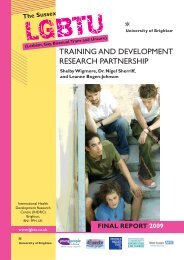TOP TIP - University of Brighton Repository
TOP TIP - University of Brighton Repository
TOP TIP - University of Brighton Repository
Create successful ePaper yourself
Turn your PDF publications into a flip-book with our unique Google optimized e-Paper software.
Supporting young fathers:<br />
examples <strong>of</strong> promising practice<br />
Work with young fathers continues to be patchy across England. In some regions<br />
it hardly seems to exist, whilst in others, the pr<strong>of</strong>ile is high. However, the signs<br />
are positive as evidence <strong>of</strong> promising work continues to emerge. In the course <strong>of</strong><br />
collating the material for this report, it has become clear that there is some<br />
excellent work currently being carried out with young fathers across the country.<br />
For example, well-established projects such as boys2MEN (London), the<br />
Mancr<strong>of</strong>t Advice Project (MAP; Norwich), Base 25 (Wolverhampton), and<br />
Fathers Plus (Newcastle), continue to develop and build up dedicated expertise<br />
in work with young men 4 . At the same time, newer, less established projects and<br />
services are also beginning to make headway such as Fathers First (Isle <strong>of</strong> Wight)<br />
that works with teenage and school-age fathers, Lewisham Young Fathers<br />
Project <strong>of</strong>fering integrated services for young fathers, and research and<br />
consultancy work with Black and Minority Ethnic young fathers in Bradford and<br />
Luton.<br />
It is <strong>of</strong> course always difficult to have a complete handle on what is happening<br />
‘on the ground’ in terms <strong>of</strong> young fathers work. A common cry from<br />
practitioners working with young fathers (or those about to), is that they <strong>of</strong>ten<br />
do not know what is going on ‘out there’: they tend to only get snippets <strong>of</strong><br />
information about existing young fathers work. Consequently, new work with<br />
young men is not always built upon the learning experiences <strong>of</strong> others. This<br />
guide therefore aims to provide a productive first-step by identifying and sharing<br />
examples <strong>of</strong> promising practice <strong>of</strong> work with young fathers from around<br />
England. It is hoped that this will not only communicate the priority that<br />
Beverley Hughes (current Minister for Children, Young People, and Families) has<br />
placed on engaging with (young) fathers, but at the same time <strong>of</strong>fer useful and<br />
practical advice on how work with young men can be taken forward.<br />
In this publication we have aimed to move beyond generalist descriptions <strong>of</strong><br />
agencies’ work. Instead, we have tried to provide the practical details that<br />
practitioners told us they want to learn about.<br />
We have deliberately included a lot <strong>of</strong> reference material at the end <strong>of</strong> the guide,<br />
including a list <strong>of</strong> contacts which summarises the work <strong>of</strong> individual agencies,<br />
details <strong>of</strong> other useful organisations, and a list <strong>of</strong> resources. We hope this will<br />
enable readers to network with each other and delve more deeply into the issues<br />
that particularly interest them.<br />
4. A list <strong>of</strong> young fathers projects consulted in the writing <strong>of</strong> this report can be found on page 60.<br />
INTRODUCTION<br />
Supporting Young Fathers 9



